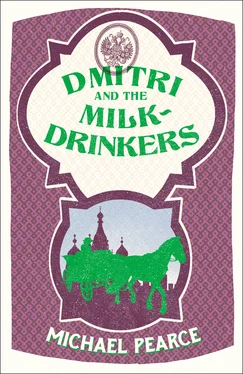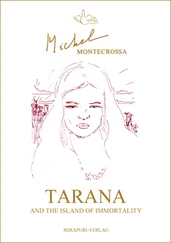Over in the corner, Ivan moved loudly. Mrs Stichkov looked at him lovingly.
‘You don’t always know what a marriage is like,’ she said, ‘not from outside. Especially not if you’re a single woman. “What does she know about it?” I say to Anna Semeonova. But Anna Semeonova stands there cold and unforgiving. “You’re too forgiving, Mrs Stichkov,” she says. “Sometimes those outside can see better.” But then, she’s another, isn’t she? Single?’
‘I believe so,’ said Dmitri.
‘She won’t be for long,’ said Mrs Stichkov. ‘Not a girl like her. So pretty! A real Russian! And rich, too. Or so Ivan says. “Stay on the right side of her,” he says, “and it’ll be worth a rouble or two.”’
‘She’s never said anything about having a boyfriend, has she?’ said Dmitri, still diligent to eliminate options.
‘Boyfriend?’ Mrs Stichkov chuckled. ‘She’s not found out yet what it is men carry inside their trousers! A real innocent! “And it’s best if she stays like that,” I said to Marfa Nikolaevna, “so don’t you go putting any of your ideas in her head!”’
‘What sort of ideas?’ said Dmitri.
Mrs Stichkov looked vague.
‘Ideas,’ she said.
Dmitri tried again.
‘This Marfa Nikolaevna,’ he said, ‘what sort of woman is she?’
‘She’s got a sharp tongue. Everyone knows that! There’s hardly anyone who’s not felt the rough edge of her tongue at some time or another. That’s why it is no one will have her. And that, of course, only makes her sharper. “It’d be a blessing,” I say to Ivan, “if some man would take that girl down in the fields some time.” “Well, no one’s going to do that,” says Ivan, “not unless it’s one of her own kind.” You’d think one of them would, wouldn’t you? She’s not bad-looking.’
‘What are these ideas you say she has?’
‘It’s not ideas,’ said Mrs Stichkov, ‘it’s what she says!’
‘And what does she say?’
‘Oh, about the land and all that.’
‘What about the land?’
‘She says it oughtn’t to be owned by anyone. “You can’t have that,” I said, “that’s silly. You can’t just leave it lying around!” “No, no,” she says, “that’s not it. Everyone would own it together, it would belong to everybody.” “The peasants wouldn’t like that,” says Ivan. “They think it should all belong to them.” “That’s because they don’t know any better,” she says. “Well, you go and tell them that,” says Ivan, “and see where it gets you!” “That’s just the trouble,” she says; “people won’t listen! And because they won’t listen, the rich can get away with anything.” “You want to watch that kind of talk, my girl,” says Ivan, “or else you’ll be in trouble.” So then she shuts up, she knows she’s gone a bit too far.’
‘Was that the kind of thing she was talking about with Anna Semeonova?’
‘She just talks,’ said Mrs Stichkov. ‘Out it all comes! Just like mother’s milk,’ she said, looking fondly down at the baby, now replete and blotto on its mother’s lap.
The houses were on the edge of town and just beyond them were open fields, still white with snow, and occasional clumps of birch trees, their branches heavy with ice. Dmitri contemplated the prospect and shuddered. Not for him the great open space of Russia, the steppe that poets sang about; for him the great open boulevards of St Petersburg, and that was exactly where he meant to be as soon as he could escape from this dump.
Back up to his left was a tanner’s yard and the smell of the yard hung over the whole area. The acrid fumes irritated his eyes and caught at his chest in a way that he did not understand until he saw the empty drums piled at the tannery gates. Chemicals were used in the yard’s processes. Little yellow rivulets ran down from the yard into the fields, colliding on the frozen surface of a small stream. Further along the stream the ice was broken and ducks, strangely discoloured, were swimming. Further along still, two women were filling pails to take up to their houses. Was this where Mrs Stichkov came to fetch her water? Where Anna Semeonova had tried to help her?
Of an impulse he went over to the two women. They put down their pails and watched him approach: a visitor from Mars.
‘I wonder if you could help me,’ he said, saluting them. ‘I’m trying to find Marfa Nikolaevna’s.’
They looked at him rather oddly. Then one of them gathered herself.
‘The tailor’s is over there,’ she said, pointing.
‘Thank you.’
He looked down at the pails. The water in them was yellowish. And, now he came to look at it, everything was yellowish. The mud was yellowish, his boots were yellowish, the broken ice on the stream was yellowish, a duck clambered out and waddled towards him and that, too, damn it, was yellowish on its underfeathers.
‘This water is not fit for drinking,’ he said sternly.
The women shrugged.
‘It’s all the water there is, Your Honour,’ said one of them.
‘You should go up beyond the yard,’ he said.
‘It’s much further,’ said one of the women quietly.
‘You should think of your children!’
‘Lev Petrovich should think of our children,’ said one of the women bitterly.
‘Lev Petrovich?’
‘He owns the yard.’
‘Someone should speak to him.’
‘Marfa Nikolaevna did,’ said the woman, ‘and see where it got her!’
‘I will speak to him.’
‘Thank you, Your Honour,’ said the other woman. ‘That may help.’
‘It won’t help,’ said the first woman dismissively. ‘He’ll just take it out on us. Thank you, Your Honour,’ she said to Dmitri. ‘It’s kindly meant, I know, but sometimes it’s best to leave things alone.’
‘Well, I’ll see … and this Marfa Nikolaevna, you say, went to see him?’
‘Yes, Your Honour.’
‘And got nowhere?’
‘She speaks too bitter,’ said the second woman.
The other woman turned on her.
‘Not this time. She spoke real civil. Agafa Sirkova was listening at the door and she said she couldn’t get over how polite she was. Not that it made any difference. He threw her out just the same.’
‘Her reputation went before her,’ said the second woman. ‘That was the trouble.’
‘It would have been the same whoever had gone.’
‘Well, that’s very true, and that’s why it’s best to leave these things alone, as you yourself were saying to this gentleman only just now.’
‘But Marfa Nikolaevna, I gather, was not one to leave things alone?’ said Dmitri.
The first woman gave a little laugh.
‘You could say that,’ she said. ‘Yes, you could certainly say that! She was a bit of a firebrand. She wasn’t one of us, Your Honour. She came from the steppes. Those Tatars, they light up at anything.’
‘Well,’ said Dmitri, ‘all this is not really my concern. I am hoping she might be able to help me on something else. The tailor’s, you say?’
As he left, he was aware again that they were looking at him rather oddly.
The snow on this side of the stream, between the houses, had become a sea of mud, through which his boots squelched noisily. Great, discoloured puddles lay everywhere. Half in one of them, half out, he could see a rat lying on its back, its body still and contorted, its feet in the air, the underside of its belly tinged with yellow. The fumes from the tannery made him cough and reach for his handkerchief. This was definitely not the place for a young woman like Anna Semeonova; nor, frankly, was it much of a place for a promising young Examining Magistrate.
Dmitri pushed open the door and went in. The room was full of women sewing. It was so dark that he was amazed that any of them could see.
Читать дальше












